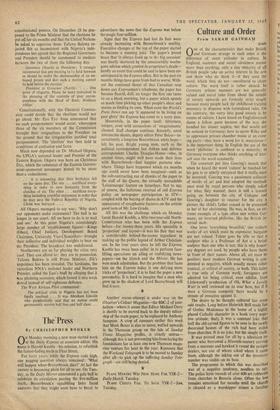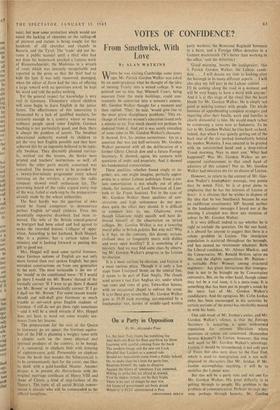Culture and Order
From SARAH GAINHAM
BONN
ONE of the characteristics that make British and Germans strange to each other is the difference of overt attitudes to culture. In England, manners and social adroitness matter more than anything; only a tiny minority of all British people take an active interest in the arts and thoSe who do think it—if they used the word, which they do not—uncultured to claim culture. The word itself is rather absurd. In Germany urbane manners are not generally valued and social rules from about the middle of society upwards are formally strict simply because many people lack the childhood training necessary to dispense with formulated rules. On the contrary, the entry into good society is by means of culture. 1 have heard an Englishwoman damn a fellow guest because of the way she handled her dinner napkin, but that would not be noticed in Germany; here to quote Rilke and to appreciate private chamber music at an even- ing party—they have a word for it, musizieren- is the important thing. In English the use of the word `philistine' is confined to a minority; in Germany everyone who thinks anything of him- self uses the word constantly.
The comment put into Goering's mouth that when he heard the word `culture' he reached for his gun is so utterly untypical that it really must be invented; Goering was a passionate collector of works of art and had adopted the methods once used by royal persons who simply asked for what they wanted; there is still a lawsuit going on between the city of Cologne and Goering's daughter to recover for the city a picture the child's father caused to be presented to her at her christening. He was, in fact, an ex- treme example of a type often met within Ger- many, an inverted philistine, like the British in- verted snob.
One loves 'everything beautiful,'• one collects 'works of art which must be expensive; bargains are not valued. Talent goes by title so that a sculptor who is a Professor of Art is a better sculptor than one who is not; this is why honor- ary degrees are used, by people who have them, in front of their names. Above all, art must be positive; most modern German writing is con- demned as negative, which usually means either ironical, or critical of society, or both. This latter is true only of German work; foreigners are admired for being critical, even nihilist. Joan Littlewood's production of Oh, What a Lovely War! is well reviewed on its tour here, but if it were a German company there would be a stream of invective against it.
The desire to be thought cultured has some odd results. Long before Heinrich Boll made fun of Gothic Madonnas in the home of a highlY placed Catholic character in a book (very nega- tive attitude, that), it was a constant joke that half the old carved figures to be seen in the newly decorated houses of the rich had been stolen from churches. It is no joke, but the simple truth.
It was proved once for all by a television re- porter who borrowed a fifteenth-century carving from a museum and hawked it round the antique dealers, not one of whom asked where it came from, although the inking out of the inventory number was visible on its base.
The programme in which this was described was of a negative tendency, needless to saV. The police have records of over 600 art robberies from churches in Bavaria alone. Often the loss remains unnoticed for months until the church is cleaned or a worshipper misses a familiar saint, but now some protection which would not entail the locking of churches or the railing-off of pictures and statues is being sought for the hundreds of old churches and chapels in Bavaria and the Tyrol. The 'trade' did not be- come a public scandal until a thief who had not done his homework pinched a famous work of Riemenschneider, the Madonna in a wreath of roses which was instantly recognisable and reported in the press so that the thief had to hide the loot. It was only recovered, damaged, when the editor of Slern had the idea of offering a large reward with no questions asked; be kept his word and told the police nothing.
Yet the general respect for knowledge is very real in Germany. Elementary school children will soon begin to learn English in the junior forms. The effectiveness of this innovation is threatened by a lack of qualified teachers, for curiously enough in a country where so many ordinary people speak some English, German teaching is not particularly good, and then, there is always the problem of accent. The Swabian educational authority wanted its children to get the very best English possible and they have achieved this by an ingenuity believed to be typic- ally Swabian. They discreetly planned curricu- la, worked out the lessons, the books were printed and teachers' instructions as well, all before the other party mainly concerned was consulted. The lessons were to be provided by a twenty-five-minute programme every school morning on the wireless, a project the radio company showed small enthusiasm for. The governing board of the radio argued every step of the way, foiled at each step by the preparations already made by the school authorities.
The final hurdle was the question of who could be found competent to demonstrate perfect English to' small children. Even this potentially expensive drawback had been re- moved. The wife of the British consul-general in Stuttgart had been asked and had agreed to make the recorded lessons. Collapse of oppo- sition. According to her husband, Ruth Heppel, who is a painter, has a certain talent for mimicry and is looking forward to putting this gift to good use.
Mrs. Heppel will need some tactful firmness, since German notions of English are not only more formal than real spoken English, but pass mistaken constructions on from one generation to the next. The most noticeable is the use of the 'would' in the conditional tense—'If I would go there I would see Mr. Brown' instead of the formally correct 'If I were to go there I should see Mr. Brown' or idiomatically correct 'If I go I shall see Mr. Brown.' For some reason would- should and will-shall give Germans as much trouble as mir-mich gives English students of German—I still do not get them right sometimes --and it will be a small miracle if Mrs. Heppel does not have to weed out some wouldy sen- tences from her lessons.
The preparations for the visit of the Queen to Germany go on apace; the German equiva- lent of the FBI is planning a weighty tome with a chapter each on the many physical and spiritual products of the country, to be bound.
it is rumoured, in elephant hide with lettering of eighteen-carat gold. Presumably an elephant from the herds that wander the Schwarzwald is to be ceremoniously shot for the cover, one likes to think with a gold-handled Mauser. Another project is to present die llerrscherin with the
original marriage certificate of Henry VIII and Anne of Cleves, a kind of step-forbear of the Queen's. The topic of all social British conver- sation is already who will be commanded to the official receptions.































 Previous page
Previous page